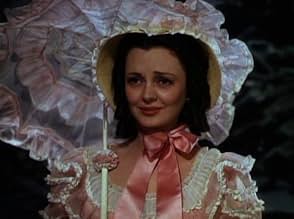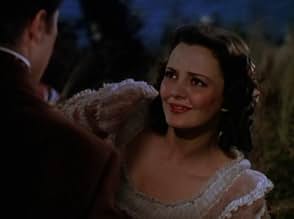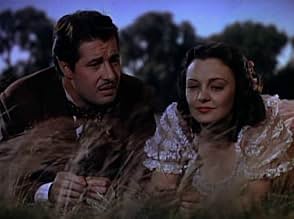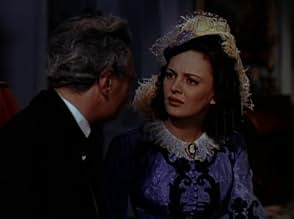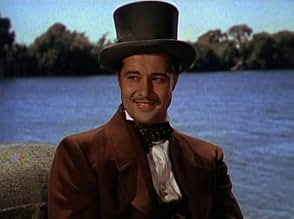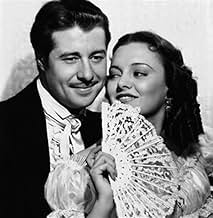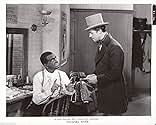Ajouter une intrigue dans votre langueMore fictional than factual biography of Stephen Foster. Songwriter from Pittsburgh falls in love with the South, marries a Southern gal (Leeds), then is accused of sympathizing when the Civ... Tout lireMore fictional than factual biography of Stephen Foster. Songwriter from Pittsburgh falls in love with the South, marries a Southern gal (Leeds), then is accused of sympathizing when the Civil War breaks out.More fictional than factual biography of Stephen Foster. Songwriter from Pittsburgh falls in love with the South, marries a Southern gal (Leeds), then is accused of sympathizing when the Civil War breaks out.
- Réalisation
- Scénario
- Casting principal
- Nommé pour 1 Oscar
- 1 victoire et 1 nomination au total
Avis à la une
Foster was the first American composer of lasting merit (although his contemporary Louis Moreau Gottschalk came close). His compositions were totally composed by him (including lyrics). But he never had any business abilities, so that while tunes like "Old Folks At Home", "Beautiful Dreamer", "The Camptown Races", "I Dream of Jeannie" and "Oh Susannah" were massive popular hits, Foster got remarkably little of the profits. Added to his problems were the lack of efficient copy-write protection in the U.S. (or on the globe, for that matter) to prevent pirating of his work. He was also the first composer who tried to live on the successful profits of his compositions. Had he been frugal, and not a drinker, it just might have worked (for a few years he did prosper), but he fumbled it. His last years were spent still composing, but living as a Bowery derelict. His end is not quite the melodrama of the film - he fell in his room cutting himself (not cutting his throat). Due to his alcoholic condition weakening his body, he died a few days later in Bellevue Hospital.
Don Ameche is a terrific actor, and does what he can here - but it reminds us of an extended development of his Edward Salomon (Lillian Russell's doomed composer husband) in the Russsell biography. He is talented - greatly so - but drink and ill health doom her here. No new extension of his acting range as Foster.
By 1939 I wonder if there was increasing criticism by African - American groups regarding stereotyping in Hollywood. Probably not too much yet, or at least enough for the industry to take notice. Films about D.D.Emmett (DIXIE), and other films with minstrel segments in them would still appear within the next decade. It really is not until the end of the 1940s and into the 1950s that an effect of World War II is felt - a dislike for the disparate treatment of African Americans - and begins to have an impact. So the minstrel portions, historically correct (unfortunately), were totally acceptable in this film in 1939.
Oddly enough, given the accidental tragedy that ends this film, the fate of E.E.Christy is overlooked. Christy apparently had a nervous breakdown in the 1860s, and threw himself out of a window. One would not know that watching Jolson's performance, based on this script.
The concluding moment of this film always stuck in my craw. Tragically announcing the death of Foster at what was supposed to be the benefit to resurrect his career, Christy/Jolson announces the first performance of Foster's latest and greatest tune. He starts singing "Old Folks At Home" (renamed "Swanee River" - as in the film title), Jolson starts singing it (remember for the first time). When the music reaches the chorus, "All the world is sad and weary..." the whole audience arose and sang it's chorus lines. Remarkable example of massive psychic transference, or poor screenplay writing: I leave it to the viewer to guess which.
Hollywood biopics about composers and musical personalities (e.g. Rodgers & Hart, Kern, Romberg, Duchin, Sousa, and a score of others) are among the most fictionalized genre in any medium. However, this one dwarfs them all. I read a brief review (I believe from Leonard Maltin) remarking that in this flick, every line of dialog seemed to spark a lyric and/or title for a new song.
Jolson's inclusion is interesting to view, especially recalling that this was a time when his tremendous career had reached a point somewhat below its former level. The following years into the 1940's would see its subsequent rejuvenation, the filming of his two highly-popular biographical pictures (they may well run this one a close second for fictional aspects), and his rise to be voted top vocalist again (besting Crosby and Sinatra), only to have ill health overtake him.
Seeing Ameche, who was to enjoy greater longevity than Jolson and many other contemporaries, along with Jolson, is a unique asset of this film. Enjoy this, along with the nostalgic period conveyed (and the sad history of callousness and lack of respect for those of color - both during the time of the story and filming), and the outstanding melodies which Mr. Foster created.
The music was great and the color very impressive for the time. Anyway, I always liked Don Ameche and remember seeing him sing and dance on Broadway in 1953 at the Winter Garden theater co-starring with Hildegarde Neff. I believe the show was Silk Stockings.
Two years after Swanee River was out, Foster and other songwriters of his era had a revival of sorts as the American Society of Composers and Publishers got into a wing ding battle with the radio and record industry and banned its music from broadcast and vinyl. What was done was that a lot of music that was in the public domain got revived in all kinds of strange ways. Swing versions of various classic and folk melodies invaded the airwaves. Country type music got it's own licensing agent in Broadcast Music Incorporated set up as a rival to ASCAP. It all got settled before Pearl Harbor and the country moved on to more important disputes. But Swanee River as a film gave Foster kind of a leg up on some of his other public domain contemporaries.
Don Ameche, fresh from another biographical triumph in Alexander Graham Bell, makes a charming, talented, but weak of character Stephen Foster. The man who created some of the most beautiful melodies ever composed, was no businessman as other reviewers pointed out. He also suffered from alcoholism which led to his early demise. Andrea Leeds is his patient and loving wife for whom I Dream of Jeannie was composed.
As was also pointed out by another reviewer, there was no such thing as ASCAP to protect the creators of melody from exploitation. What Al Jolson's E.P. Christy did to Stephen Foster insofar as his first song hit, Oh Susanna is concerned was not only true, but quite the norm. What Christy did was also decide maybe he ought to cut Foster in on the profits to keep the creative spigot flowing.
Jolson as Christy was the premier minstrel artist of his day when that form of entertainment was acceptable and popular. Of course Jolson got his start in minstrel shows and damage to his reputation has come because he never would discard the black-face. This is the only time on film that Jolson plays a real life character and he sings the Foster songs with feeling and the inimitable Jolson style.
By dint of the fact that his songs were minstrel show material and some and only some glorified the old South, Foster himself has come down as damaged goods in these politically correct days. That's a pity because items like Beautiful Dreamer, Old Dog Trey, My Old Kentucky Home are the stuff of genius.
It's not the complete truth, but Swanee River still holds up as a nice account of America's premier melody maker of his century.
Le saviez-vous
- GaffesThe film's final scene is wholly inaccurate; there was no performance by E.P. Christy on the day that Foster died. In reality, Christy actually died nearly two years before Foster; he committed suicide by throwing himself from a window at his home in New York City in May 1862; Foster himself died in January 1864.
- Citations
Stephen Foster: [he whistles a version of Oh! Susanna] That ending isn't right yet.
Jane McDowell Foster: You know, I think the Negroes would finish it like this
[she whistles the tune]
Stephen Foster: Why, that's right! How did you know?
Jane McDowell Foster: You forget, I was brought up on Negro music.
Stephen Foster: I wish I'd been. As I boy in Pittsburgh, I heard just enough of it to want to hear more. I'd a colored nurse you know. Sometimes, she'd take me down to their little church by the river, I heard "Sweet Chariot", "Roll Jordan", all the rest.
Jane McDowell Foster: There's nothing like them, is there?
Stephen Foster: No. They have something all their own. It's... well, it's music from the heart. From the heart of a simple people. That's why it moves you like it does. And by jingo, it's the only real American contribution to music. I wonder...
Jane McDowell Foster: Wonder what?
Stephen Foster: Why no one's taken the trouble to write it down; to develop the material and compose original music in the same mood.
Jane McDowell Foster: Well, why don't you, Stephen?
Stephen Foster: Why don't I? Well, why don't I?
Jane McDowell Foster: You can, I'm sure. You have a wonderful feeling for it.
Stephen Foster: If I do, it'll be your fault. You'll have to take the blame for it. Because you'll be the music. You'll be all the songs I'll ever write. Without you, I don't think I could write them. I think they'd just, well they'd just die.
Jane McDowell Foster: Then we mustn't let them die.
- Crédits fous[prologue] This is the strange story of a Northern youth to whom the Southland brought immortal inspiration.....Though his stormy life is long forgotten, his simple words and simple music live on in the hearts of the whole American people.
- ConnexionsReferenced in Fresh Hare (1942)
- Bandes originalesCurry a Mule
Written by Sidney Lanfield & Louis Silvers
Meilleurs choix
Détails
- Date de sortie
- Pays d’origine
- Langue
- Aussi connu sous le nom de
- Swanee River: The Story of Stephen C. Foster
- Lieux de tournage
- Société de production
- Voir plus de crédits d'entreprise sur IMDbPro
Box-office
- Montant brut aux États-Unis et au Canada
- 285 100 $US
- Durée
- 1h 24min(84 min)
- Rapport de forme
- 1.37 : 1

